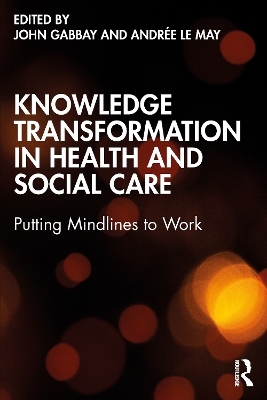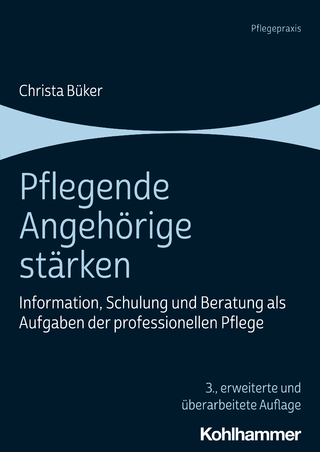
Knowledge Transformation in Health and Social Care
Routledge (Verlag)
978-0-367-74616-2 (ISBN)
This illuminating book shows how the mindlines model can be put to work. It highlights how practitioners collectively share and internalise implicit, flexible ways of rapidly handling complex clinical situations. Drawing on research and reflective studies from practice, education, and guidelines-development across a wide range of international health and care settings, the authors unpack the general components of mindlines. They find practical ways to uncover, bring together and apply specific mindlines to improve practice; and to develop evidence-based healthcare policy, practice and education in ways that capitalise on the crucial role of mindlines. Closely edited by the originators of the mindlines model, this book brings together the work of a cohesive group of researchers and practitioners to showcase and develop its theory and consequences.
It is an essential read for all those interested in knowledge mobilisation, evidence-based practice, and research implementation both within healthcare and beyond.
John Gabbay is Professor Emeritus of Public Health and former Director of the Wessex Institute at the University of Southampton. He is also Honorary Senior Visiting Fellow at Cambridge Public Health, University of Cambridge and a Senior Member of Darwin College, Cambridge. Until recently he was Implementation co-Lead at the NIHR East of England Applied Research Collaboration, UK. Andrée le May is Professor Emerita of Nursing at the University of Southampton. She is Editor-in-Chief for the NIHR’s Journals Library for the Health and Social Care Delivery Research, Public Health, Global Health, and Programme Grants for Applied Research journals. She is also co-Editor of the Journal of Research in Nursing and Honorary Visiting Senior Fellow at Cambridge Public Health, University of Cambridge. Until recently she was Implementation co-Lead for the NIHR East of England Applied Research Collaboration.
1.Introducing Mindlines and this Book. 2.What (and Why) are Mindlines? 3.Making Evidence Rich, Relevant, and Real: Using Theatre-Based Knowledge Mobilisation Strategies to Enhance Mindlines and Hence Practice. 4.Mindlines in the Moment – the Constant Unfolding of Complex Performance. 5.Using Co-Creation to Modify Mindlines and Improve childhood Eczema Care. 6.The Confluence of Mindlines and Emotion in Community-Based Palliative Care. 7.Rethinking Nurses’ Mindlines about the Liverpool Carer Pathway: the Knowledge Behind the Care. 8.How Mindlines were Shepherded across Complex Networks, Enabling New Learning about Sepsis to Flourish. 9.On becoming a (Physio)therapist: Mindlines Changing Education. 10.Impure Guidance? How Mindlines Inform Guidelines. 11.The guideline development process: building a lexicon of mindlines. 12.Regressive logic, common sense and evidentness: thoughts of a guideline-writing epidemiologist. 13.Knowledge Transformation amidst the 2020 COVID-19 Surge: report from New York City. 14.The Mindlines Model: an Update. 15.Postscript: Does the Mindline Model Apply Beyond Healthcare?
| Erscheinungsdatum | 22.12.2022 |
|---|---|
| Zusatzinfo | 9 Tables, black and white; 16 Line drawings, black and white; 6 Halftones, black and white; 22 Illustrations, black and white |
| Verlagsort | London |
| Sprache | englisch |
| Maße | 156 x 234 mm |
| Gewicht | 485 g |
| Themenwelt | Sachbuch/Ratgeber ► Gesundheit / Leben / Psychologie |
| Pflege ► Studiengänge ► Pflegewissenschaft | |
| Medizin / Pharmazie ► Studium | |
| ISBN-10 | 0-367-74616-6 / 0367746166 |
| ISBN-13 | 978-0-367-74616-2 / 9780367746162 |
| Zustand | Neuware |
| Informationen gemäß Produktsicherheitsverordnung (GPSR) | |
| Haben Sie eine Frage zum Produkt? |
aus dem Bereich


